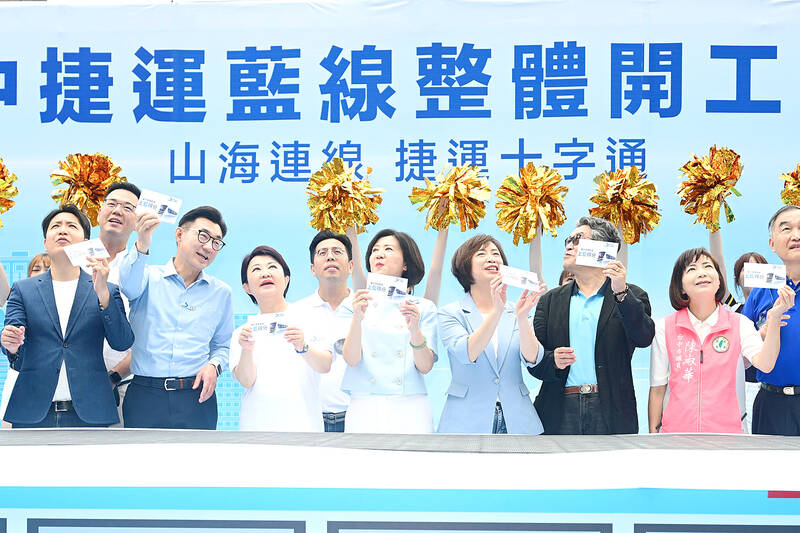The Taichung City Government yesterday held a groundbreaking ceremony for the Blue Line of the city’s MRT system, scheduled to be completed in 2034.
The ceremony was held in front of Taichung City Hall, with Taichung Mayor Lu Shiow-yen (盧秀燕), Deputy Legislative Speaker Johnny Chiang (江啟臣), several Chinese Nationalist Party (KMT) lawmakers and officials from the Ministry of Transportation and Communications in attendance.
There is no need to delay any more, as the people of Taichung have waited for 20 years, Lu said yesterday.

Photo: Liao Yao-tung,Taipei Times
The new line is set to run eastward from the Port of Taichung, connecting mountainous areas with the coast and intersecting with the Green Line at city hall, she said.
It is the most important construction project in central Taiwan over the next decade, Lu added.
Once construction of the new line starts, the city would start construction on seven lines in parallel to form a network around Taiwan’s central region, Lu said.
While Taipei and New Taipei City have developed MRT systems, central Taiwan is lacking, she said.
Developing one line at a time is too slow, Lu said, adding that she hopes the legislature and central government could provide assistance for the new lines so that work could start as soon as possible.
The Blue Line would be 24.78km long with 20 stations, starting from the Port of Taichung and ending at the Jianguo Market (建國市場) in East District (東區), Taichung Rapid Transit System Bureau head Su Jui-wen (蘇瑞文) said.
The total project cost is estimated at NT$161.5 billion (US$5.5 billion), Su added.
The new line would have elevated and underground sections, with stations by the coast using rust-resistant technology to ensure durability, he said.
Construction on underground stations would use earth-pressure balance shields to reduce the impact on residents, he said.
Stations intersecting with the Green Line and Taiwan Railway Corp lines would offer in-station transfers for passengers to maximize convenience, he said.

SHIPS, TRAINS AND AUTOMOBILES: The ministry has announced changes to varied transportation industries taking effect soon, with a number of effects for passengers Beginning next month, the post office is canceling signature upon delivery and written inquiry services for international registered small packets in accordance with the new policy of the Universal Postal Union, the Ministry of Transportation and Communications said yesterday. The new policy does not apply to packets that are to be delivered to China, the ministry said. Senders of international registered small packets would receive a NT$10 rebate on postage if the packets are sent from Jan. 1 to March 31, it added. The ministry said that three other policies are also scheduled to take effect next month. International cruise ship operators

NUMBERS IMBALANCE: More than 4 million Taiwanese have visited China this year, while only about half a million Chinese have visited here Beijing has yet to respond to Taiwan’s requests for negotiation over matters related to the recovery of cross-strait tourism, the Tourism Administration said yesterday. Taiwan’s tourism authority issued the statement after Chinese-language daily the China Times reported yesterday that the government’s policy of banning group tours to China does not stop Taiwanese from visiting the country. As of October, more than 4.2 million had traveled to China this year, exceeding last year. Beijing estimated the number of Taiwanese tourists in China could reach 4.5 million this year. By contrast, only 500,000 Chinese tourists are expected in Taiwan, the report said. The report

The Forestry and Nature Conservation Agency yesterday launched a gift box to market honey “certified by a Formosan black bear” in appreciation of a beekeeper’s amicable interaction with a honey-thieving bear. Beekeeper Chih Ming-chen (池明鎮) in January inspected his bee farm in Hualien County’s Jhuosi Township (卓溪) and found that more than 20 beehives had been destroyed and many hives were eaten, with bear droppings and paw prints near the destroyed hives, the agency said. Chih returned to the farm to move the remaining beehives away that evening when he encountered a Formosan black bear only 20m away, the agency said. The bear

Chinese embassy staffers attempted to interrupt an award ceremony of an international tea competition in France when the organizer introduced Taiwan and displayed the Republic of China flag, a Taiwanese tea farmer said in an interview published today. Hsieh Chung-lin (謝忠霖), chief executive of Juxin Tea Factory from Taichung's Lishan (梨山) area, on Dec. 2 attended the Teas of the World International Contest held at the Peruvian embassy in Paris. Hsieh was awarded a special prize for his Huagang Snow Source Tea by the nonprofit Agency for the Valorization of Agricultural Products (AVPA). During the ceremony, two Chinese embassy staffers in attendance